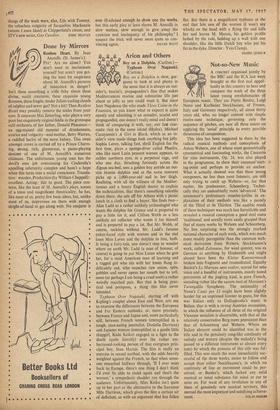Visual Aids
ON Monday afternoon the Vice- Chancellor of Reading, Sir John Wolfenden, appeared on ITV to introduce the schools broadcasting programme of Association Re- diffusion. 'It is,' he said, 'an important day in the history of television. In a few minutes you will see the beginning of the first planned series of television for schools which will run for five days week over the next eight weeks. It is a sincere and genuine attempt to use television seriously.' Then Sir Kenneth Clark, Chairman of ITA, made a speech-day allocution in miniature. 'I don't know much about education but I suppose it involves in about equal parts experience and discipline.' If I caught his words correctly Sir Kenneth suggested that we can learn more from our eyes in a flash than by months of reading. Win, as Mr. Driberg would say. It all depends what you look at and what you read. However, Sir Kenneth went eloquently on to describe how the experiencing eye can be disciplined to discriminate between good shapes and bad shapes, to recognise underlying structures and to see similars in dissimilars, which is the origin of poetry as well as of science. I suppose that this was aimed at the teachers, rather than at the 14-15-year-old secondary moderns, but it was a good introduction to th,e Monday series Look- ing and Seeing. The other series are The Ballad Story, Obtaining a Job, A Year of Observation (the Geophysical Year) and People Among Us.
Looking and Seeing showed us a boy who goes to school through Covent Garden hardly noticing anything but the bananas which remind him of bananas and cream. An Indian girl to whom it was all unfamiliar saw much more and pictures of Indian markets came into her mind's eye and on to the television screen. From time to time Mr. Redvers Kyle (he looked to me like a typical school teacher, cardigan and all) asked the viewers questions to test what they had seen on the screen. Then he brought on an artist to sketch what he had seen in the Garden. Only a teacher can be a judge of the educational content of this pro- gramme. I thought it covered too much ground, that the eye of the camera was most un- distinguished and that the rich history of Covent Garden was made more unexciting than I would have believed possible. Homework for the week : to inspect a square yard of ground and compare our observations next Monday with Mr. Kyle's.
I suppose the event of the week was the BBC production of Under Milk Wood. I have the records of the original BBC production and I've seen it in the theatre and I've had enough. But the household enjoyed it and my ten-year-old, a fervent Welsh nationalist, fought with the cunning of Glendower to be allowed to see it through. Some of Thomas's friends ('the manuscript was lying about our house for weeks') told me they thought the BBC should have left it to sound radio for which it was written and that something which after all was intended to be Llareggub had been blown up too much. The following evening Mr. Bevan appeared on Press Conference, the . new and gentler Nye, who is now being praised by black reactionaries who used to think of him as the Nogood Boyo of Labour. 'I've not changed,' said Mr. Bevan. It was one of the best Press Conferences I have seen because it was composed of mature journalists (Williams, Del- mar and Newman of the Herald Tribune, and Muggeridge) and because Bevan cares more about ideas than do the rigid party-line toers. I mildly enjoyed Bernard Miles's latest Titlark, and Canadian Television's Big League' Goalie for its display of 'method' acting on television. The worst things of the week were, alas, Life with Tommy, the suburban vulgarity of Jacqueline Mackenzie (whom I once liked) at Chipperfield's circus, and ITV's new series, Gay Cavalier. JOHN BEAVAN



































 Previous page
Previous page